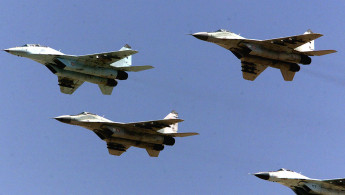Houthis take 'partial' control of Yemeni Air Force
Houthis take 'partial' control of Yemeni Air Force
Documents seen by al-Araby al-Jadeed indicate that wholesale changes have been made in the Air Force leadership by the Houthis.
3 min read
The majority of Yemen's fighter jets are Russian-made (AFP)
The Houthi movement in control of Yemen's capital Sanaa has made wholesale changes to the leadership of Yemen's Air Force, documents obtained by al-Araby al-Jadeed show.
The changes have not been announced publically, but involve the appointment of 10 new Air Force generals; Abdallah al-Harazi as adviser to the commander of the Air Defence Affairs, Alkhadr Salem Ali as deputy commander of the Aviation Affairs, Yahya al-Rowaishan as deputy commander of the Air Defence Affairs, Ali al-Dhameen as commander of the Hodeida air base and Brigade 67, Omar Saleh as commander of the Eighth Brigade, Abdelrahman al-Wathri as deputy director of the Aviation and Air Defence College, Zaid al-Akwa as commander of the Fourth Brigade, Abdelmalek Abu Talib as chief of staff of the Eighth Brigade, Abdelwali Muhammed Ali al-Houthi as head of operations of the Eighth Brigade, and Khaled Qassem Fadil as deputy director of the administrative directorate.
The changes have not been announced publically, but involve the appointment of 10 new Air Force generals; Abdallah al-Harazi as adviser to the commander of the Air Defence Affairs, Alkhadr Salem Ali as deputy commander of the Aviation Affairs, Yahya al-Rowaishan as deputy commander of the Air Defence Affairs, Ali al-Dhameen as commander of the Hodeida air base and Brigade 67, Omar Saleh as commander of the Eighth Brigade, Abdelrahman al-Wathri as deputy director of the Aviation and Air Defence College, Zaid al-Akwa as commander of the Fourth Brigade, Abdelmalek Abu Talib as chief of staff of the Eighth Brigade, Abdelwali Muhammed Ali al-Houthi as head of operations of the Eighth Brigade, and Khaled Qassem Fadil as deputy director of the administrative directorate.
| Read also: Secret appointments revealed at sensitive military positions in Yemen |
Meanwhile, official sources confirmed the arrival of three Russian Sukhoi aircraft at Hodeida port, on the Red Sea coast, as part of a deal made by the Yemeni government with Belarus in 2009. Several media sources reported the aircraft had been transported to the Houthi stronghold of Sadah, but this has been denied by the commander of the Air Force, Rashid al-Jund, in a statement published by the Yemeni Ministry of Defence website.
Jund stated the aircraft were still at the port and that they would be transported to their allocated airbase.
Al-Daylami air base
Sami Noman, a Yemeni journalist who has been closely monitoring the activities of the Yemeni Air Force, told al-Araby that the Houthis would not need to move the aircraft to Sadah.
"The Houthis have full control of al-Daylami air base, the main Air Force base in Sanaa, as well as Hodeida air base," Noman said. "The movement would not need to transport the aircraft to Sadah where there is no military airbase. Sadah's civilian airport requires additional modifications if it is to be made suitable for military use."
"Debating whether Sadah airport is currently being used for military purposes is meaningless," he added, "as there is no current threat to their influence over the military air bases in Sanaa and Hodeida."
Similarily a Yemeni Air Force pilot, who did not wish to be named, told al-Araby al-Jadeed that the aircraft could not be transported to Sadah because the airport there did not have the infrastructure necessary to receive them.
Meanwhile, a military source indicated that the changes in the Air Force leadership were made because pilots were refusing commands not delivered to them by commanders within the Air Force.
"Hodeida air base received orders from the Houthis to mobilise forces and strike anti-Houthi tribal militants in Marib province... However, the pilots refused to obey the orders unless issued directly by the commander of the Air Force," the source said.
Yemeni Air Force
The Yemeni Air Force has in its possession nearly 250 aircraft including fighter jets, transporters, helicopters and training aircraft. The majority of the aircraft are Russian-made and are distributed among eight air brigades in six air bases, the most important of which is al-Daylami in Sanaa.
Both al-Daylami and Hodedia air bases are under the control of the Houthis.
However, a number of military bases remain uncontrolled by the Houthis in the cities beyond their power. These bases are al-Anad in Lahj, near Aden, Rayyan in Hadhramaut, Tariq in Taiz and Ataq in Shabwa.
The new commander of the Air Force Rashid al-Jund succeeded Muhammed Saleh al-Ahmar, the half-brother of former president Ali Abdullah Saleh. According to a Yemeni fighter pilot, Jund is not popular within the Air Force.
"He [Jund] has not established their [the pilots'] rights, but has carried on with the same approach as his predecessor," the piot said, while adding that corruption had led to the acquisition of defective military aircraft.
This article is a translated version from our Arabic edition.



